Allegory for a Canadian Election
See just this Post & Comments
/ 0 Comments so far / Post a Comment /
Home 
Next, Back, Thread Ahead: Jumblies under the red sky, Thread Back: Quality - John Galsworthy.with Michaëlle Jean, Governor General of Canada, and Marie-Eden Jean, her daughter, as Alice; Jean Chretien, former Prime Minister of Canada, as 'the Carpenter'; current Prime minister of Canada, Paul Martin Jr., as a Walrus; a-and a host of clams.
 from Through the Looking-Glass, Chapter IV
from Through the Looking-Glass, Chapter IV
Lewis Carroll / Charles Dodgson
'But it certainly WAS funny,' (Alice said afterwards, when she was telling her sister the history of all this,) 'to find myself singing "HERE WE GO ROUND THE MULBERRY BUSH." I don't know when I began it, but somehow I felt as if I'd been singing it a long long time!'
The other two dancers were fat, and very soon out of breath. 'Four times round is enough for one dance,' Tweedledum panted out, and they left off dancing as suddenly as they had begun: the music stopped at the same moment.
 Then they let go of Alice's hands, and stood looking at her for a minute: there was a rather awkward pause, as Alice didn't know how to begin a conversation with people she had just been dancing with. 'It would never do to say "How d'ye do?" NOW,' she said to herself: 'we seem to have got beyond that, somehow!'
Then they let go of Alice's hands, and stood looking at her for a minute: there was a rather awkward pause, as Alice didn't know how to begin a conversation with people she had just been dancing with. 'It would never do to say "How d'ye do?" NOW,' she said to herself: 'we seem to have got beyond that, somehow!'
'I hope you're not much tired?' she said at last.
'Nohow. And thank you VERY much for asking,' said Tweedledum.
'So much obliged!' added Tweedledee. 'You like poetry?'
 'Ye-es, pretty well--SOME poetry,' Alice said doubtfully. 'Would you tell me which road leads out of the wood?'
'Ye-es, pretty well--SOME poetry,' Alice said doubtfully. 'Would you tell me which road leads out of the wood?'
'What shall I repeat to her?' said Tweedledee, looking round at Tweedledum with great solemn eyes, and not noticing Alice's question.
'"THE WALRUS AND THE CARPENTER" is the longest,' Tweedledum replied, giving his brother an affectionate hug.
Tweedledee began instantly: 'The sun was shining--'
Here Alice ventured to interrupt him. 'If it's VERY long,' she said, as politely as she could, 'would you please tell me first which road--'
Tweedledee smiled gently, and began again:
The Walrus and the Carpenter
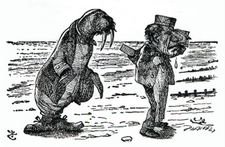 The sun was shining on the sea,
The sun was shining on the sea,
Shining with all his might:
He did his very best to make
The billows smooth and bright—
And this was odd, because it was
The middle of the night.
The moon was shining sulkily,
Because she thought the sun
Had got no business to be there
After the day was done—
“It’s very rude of him,” she said,
 “To come and spoil the fun!”
“To come and spoil the fun!”
The sea was wet as wet could be,
The sands were dry as dry.
You could not see a cloud, because
No cloud was in the sky:
No birds were flying overhead—
There were no birds to fly
The Walrus and the Carpenter
Were walking close at hand;
They wept like anything to see
Such quantities of sand:
“If this were only cleared away,”
They said, “It would be grand!”

“If seven maids with seven mops
Swept for half a year,
Do you suppose,” the walrus said,
“That they could get it clear?”
“I doubt it,” said the Carpenter,
And shed a bitter tear.
“O, Oysters, come and walk with us!”
The Walrus did beseech.
“A pleasant walk, a pleasant talk,
Along the briny beach:
We cannot do with more than four,
To give a hand to each.”
 The eldest Oyster looked at him,
The eldest Oyster looked at him,
But never a word he said:
The eldest Oyster winked his eye,
And shook his heavy head—
Meaning to say he did not choose
To leave the oyster-bed.
But four young Oysters hurried up,
All eager for the treat:
Their coats were brushed, their faces washed,
Their shoes were clean and neat-
And this was odd, because, you know,
They hadn’t any feet.
Four other Oysters followed them,
And yet another four;
And thick and fast they came at last,
And more, and more, and more-
All hopping through the frothy waves,
And scrambling to the shore.
 The Walrus and the Carpenter
The Walrus and the Carpenter
Walked on a mile or so,
And then they rested on a rock
Conveniently low:
And all the little Oysters stood
And waited in a row.
“The time has come,” the Walrus said,
“To talk of many things:
Of shoes—and ships—and sealing wax—
Of cabbages—and kings—
And why the sea is boiling hot—
And whether pigs have wings.”
“But wait a bit,” the Oysters cried,
“Before we have our chat;
For some of us are out of breath,
And all of us are fat!”
“No hurry!” said the Carpenter.
They thanked him much for that.
“A loaf of bread,” the Walrus said,
“Is what we chiefly need:
Pepper and vinegar besides
Are very good indeed—
Now if you’re ready, Oysters dear,
We can begin to feed.”
“But not on us!” the Oysters cried,
Turning a little blue,
“After such kindness, that would be
A dismal thing to do!”
“The night is fine,” the Walrus said.
“Do you admire the view?”
 “It was so kind of you to come!
“It was so kind of you to come!
And you are very nice!”
The Carpenter said nothing but
“Cut us another slice:
I wish you were not quite so deaf—
I’ve had to ask you twice!”
“It seems a shame,” the Walrus said,
“To play them such a trick,
After we’ve brought them out so far,
And made them trot so quick!”
The Carpenter said nothing but
“The butter’s spread too thick!”
 “I weep for you,” the Walrus said:
“I weep for you,” the Walrus said:
“I deeply sympathize.”
With sobs and tears he sorted out
Those of the largest size,
Holding his pocket-handkerchief
Before his streaming eyes.
“O Oysters,” said the Carpenter,
“You had a pleasant run!
Shall we be trotting home again?”
But answer came there none—
And this was scarcely odd, because
They’d eaten every one.

Wot! Me worry?
Alfred E. Neuman
Tweedle Dee & Tweedle Dum
Bob Dylan (with illustrations of the other Alice, the same walrus, and the Cheshire Cat)
 Tweedle-dee Dum and Tweedle-dee Dee
Tweedle-dee Dum and Tweedle-dee Dee
They're throwing knives into the tree
Two big bags of dead man's bones
Got their noses to the grindstones
Living in the Land of Nod
Trustin' their fate to the Hands of God
They pass by so silently
Tweedle-dee Dum and Tweedle-dee Dee
Well, they're going to the country, they're gonna retire
They're taking a streetcar named Desire
Looking in the window at the pecan pie
Lot of things they'd like they would never buy
Neither one gonna turn and run
They're making a voyage to the sun
"His Master's voice is calling me,"
Says Tweedle-dee Dum to Tweedle-dee Dee
 Tweedle-dee Dee and Tweedle-dee Dum
Tweedle-dee Dee and Tweedle-dee Dum
All that and more and then some
They walk among the stately trees
They know the secrets of the breeze
Tweedle-dee Dum said to Tweedle-dee Dee
"Your presence is obnoxious to me."
They're like babies sittin' on a woman's knee
Tweedle-dee Dum and Tweedle-dee Dee
Well, the rain beating down on my windowpane
I got love for you and it's all in vain
Brains in the pot, they're beginning to boil
They're dripping with garlic and olive oil
Tweedle-dee Dee - he's on his hands and his knees
Saying, "Throw me somethin', Mister, please."
"What's good for you is good for me,"
Says Tweedle-dee Dum to Tweedle-dee Dee
Well, they're living in a happy harmony
Tweedle-dee Dum and Tweedle-dee Dee
They're one day older and a dollar short
They've got a parade permit and a police escort
They're lying low and they're makin' hay
They seem determined to go all the way
They run a brick and tile company
Tweedle-dee Dum and Tweedle-dee Dee
Well a childish dream is a deathless need
And a noble truth is a sacred creed
My pretty baby, she's lookin' around
She's wearin' a multi-thousand dollar gown
Tweedle-dee Dee is a lowdown, sorry old man
Tweedle-dee Dum, he'll stab you where you stand
"I've had too much of your company,"
Says, Tweedle-dee Dum to Tweedle-dee Dee

(Michaëlle Jean and her family are included here as an honour to them and no disrespect whatsoever is intended. This should not have to be said. That it does need to be will possibly form the subject of a later post.)Tags: Walrus, Carpenter, Lewis Carroll, Michaëlle Jean.
Building in a bag.
See just this Post & Comments
/ 1 Comments so far / Post a Comment /
Home 
Next, Back, Thread Ahead: Tensegrity Architecture.
http://davidleewilson.blogspot.com/2006/09/tensegrity-architecture.html
http://www.wired.com/news/technology/0,1282,66872,00.html
This looks like a good thing - a bit heavy maybe.
 Back in 1979, two of my teachers at Architecture School, Jim Strutt and Bill Dawson, they had a company called Descon International ... anyway the three of us designed a survival shelter - a rhombicubocatahedron tensegrity made of Fabrene, cardboard tubes and beach balls. That was for Pakistan too - there was some war that year and there were tens of thousands of people living in fields in the rain, Afghanis who had fled across the border? I don't remember. We called it a Renaissance Yurt.
Back in 1979, two of my teachers at Architecture School, Jim Strutt and Bill Dawson, they had a company called Descon International ... anyway the three of us designed a survival shelter - a rhombicubocatahedron tensegrity made of Fabrene, cardboard tubes and beach balls. That was for Pakistan too - there was some war that year and there were tens of thousands of people living in fields in the rain, Afghanis who had fled across the border? I don't remember. We called it a Renaissance Yurt.
We put the Fabrene together with an experimental double-sided tape from 3M. Now woven polyethelene is strong and good and cheap stuff but it is still polyethylene and there is a small fraction of liquid ethylene in it, and this liquid tends to migrate to the surface. We put our prototype up on the front lawn of the Parliament Buildings in Ottawa, with the assistance of some hippies who had a Peace Camp going on there. It stood up long enough for some photographs to be taken - made the paper the next day - but by the next day enough ethylene collected to let the tape slip and it subsided gently into a heap.
 And that was that.
And that was that.
Thermal welding might have worked, but the strength characteristics of the high density polyethylene core of Fabrene would make quality control touchy - any temperature spike would denature the core. A modified tape with an additive to react with or absorb ethylene was another possibility. In the end, other matters interceded and we went our separate ways.
The 'invention' of Tensegrity is often erroneously attributed to Buckminster Fuller. In fact it was Kenneth Snelson who found it and brought it to him - Snelson was one of Bucky's students at the time. But neither of them invented it - the principle is that universal. I think we have to allow God, or the Great Yin Yang, or that vast repository of archetypes the Spiritus Mundi, as the originator. I myself dreamed it one day, from first principles, and briefly ran through the streets - "Eureka!".
Tags: Descon, Tensegrity, Kenneth Snelson, Bucky.
Lakewood Church
See just this Post & Comments
/ 1 Comments so far / Post a Comment /
Home 
Next, Back.
 I went over to Lakewood Church this morning, to listen to Joel Osteen, the Houston evangelist. My friend Big Mike the taxi driver, says he should be President.
I went over to Lakewood Church this morning, to listen to Joel Osteen, the Houston evangelist. My friend Big Mike the taxi driver, says he should be President.
It is a HUGE church, seating for 15,000 or so - they bought an arena of some kind and converted it. It sits at the intersection of the Southwest Freeway #59 and a street, Edloe, which does connect with the expressway - so it is a big square box of a building wrapped up in on-ramps and off-ramps and parkades and surrounded by high-rise buildings and asphalt. The sanctuary has its hard surfaces all covered up for good sound, three large screens and a dozen booms carrying cameras, well lit in full colour, comfortable seats. I did not see a cross anywhere. The place was not full, maybe it was 1/4 full, this was the early service - but people sat up front first so it felt fuller than it was.
This merits emphasis - I have passed through a lot of sanctuaries in a lot of churches; and I have seen full ones before, in Brasil they fill to the doors five times and more of a Sunday, standing room only; but I have never seen a church fill at the front first, not one time, never.
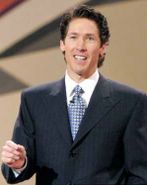 Joel himself was not there this morning - his brother Paul, a woman - I didn't get her name, and the spanish language pastor Marcos Witt filled in for him.
Joel himself was not there this morning - his brother Paul, a woman - I didn't get her name, and the spanish language pastor Marcos Witt filled in for him.
There was a large-ish choir, and a band with a brass section. The music was that kind of new-age christian stuff that I find very hard to sing - not enough melody - but the message was good: "I am still standing", well yes, as a matter of fact I am. They might do well to try some of those old Methodist hits, take fifteen minutes and teach one or two to the congregation, it could be done. Well now, nevermind the music, this room had every colour and age of person, some dressed up and some dressed down, some loudly praising, some dancing, some standing and and some sitting quietly.
 Marcos Witt preached on hurt and anger and bitterness. He said put them away. He said put it all in the garbage, because it is garbage and it makes you stink. He gave a few practical tips to help you do that - love your enemy and forgive those who hate you. He called the congregation 'champions'. He said you can't be champions if you are dragging around all of the rebukes you have ever received so put them down and leave them down.
Marcos Witt preached on hurt and anger and bitterness. He said put them away. He said put it all in the garbage, because it is garbage and it makes you stink. He gave a few practical tips to help you do that - love your enemy and forgive those who hate you. He called the congregation 'champions'. He said you can't be champions if you are dragging around all of the rebukes you have ever received so put them down and leave them down.
Good preaching. Good advice.
The woman beside me put her hand on my shoulder and I put my hand on hers, and we exchanged names and prayed for one another, that we would find the strength to forgive and get on with joyful living.
I am posting this because I know that some of my friends hear about churches like this and think that they somehow represent an intolerant, ultra-conservative, ultra-right-wing America, some kind of evil empire working to swallow up suggestible minds, put them in brigades and send them off to make war on intellect. Maybe this goes on somewhere else, but from what I saw it does not go on at the biggest church in Houston.
Witt was inviting people to come along to the spanish service later on - at one point he said, "bring your yard man". He said it with a smile. Now the fact is that in Houston, lots of the yard men are indeed spanish, there is an under-class, surprise, surprise - and in most other places such a politically incorrect phrase would not be openly spoken. But of all I saw and heard today that little sentence moved me the most, proved something to me, and made me want to go back there again sometime for more.
I say, form your own opinion, check it out for yourself:
Lakewood Church / Joel Osteen
Tags: Houston, Lakewood, Osteen, Evangelist.
Ideology & Compassion, Mediocrity
See just this Post & Comments
/ 2 Comments so far / Post a Comment /
Home 
Next, Back.
 I went to the Thanksgiving Day Parade in Houston and all I got was this picture and these few thoughts ...
I went to the Thanksgiving Day Parade in Houston and all I got was this picture and these few thoughts ...
Ideology: The science of ideas; that department of philosophy or psychology which deals with the origin and nature of ideas.
The study of the way in which ideas are expressed in language.
Ideal or abstract speculation; in a depreciatory sense, unpractical or visionary theorizing or speculation.
A systematic scheme of ideas, usually relating to politics or society, or to the conduct of a class or group, and regarded as justifying actions, especially one that is held implicitly or adopted as a whole and maintained regardless of the course of events.
"Ideology, by which nickname the French ruler Bonaparte used to distinguish every species of theory, which, resting in no respect upon the basis of self-interest, could, he thought, prevail with none save hot-brained boys and crazed enthusiasts."
"It is despair at finding a solution to this problem which is responsible for much of the success of Fascist blood-and-soil ideology."
Compassion: Suffering together with another, participation in suffering; fellow-feeling, sympathy.
The feeling or emotion, when a person is moved by the suffering or distress of another, and by the desire to relieve it; pity that inclines one to spare or to succour.
Also as a verb.
 O heavens, can you hear a good man groan,
O heavens, can you hear a good man groan,
And not relent, or not compassion him?
Marcus, attend him in his ecstasy,
That hath more scars of sorrow in his heart
Than foemen's marks upon his batter'd shield;
But yet so just that he will not revenge.
(Shakespeare, Titus Andronicus)
The OED definitions of ideology recapitulate a spiral development it seems to me, from thought through language to mere correctitude. A spiral and yet still at the crossing - at the intersection where reality springs upon us and choices are made. At the meeting of Jacob's ladder and the Interstate Highway horizon. In the trumpet moment, in the twinkling. When that steamboat whistle blows, I'm gonna give you all I got to give. Or you may walk away, and find the moment again, later on, have it find you.
And yes, the intersections are a jam of 'hot-brained boys and crazed enthusiasts', hot brained girls too these days. They are bound to collect there, sea wrack, fetching up where the currents carry them.
 Robert Johnson - Cross Road Blues
Robert Johnson - Cross Road Blues
I went down to the crossroad, fell down on my knees
I went down to the crossroad, fell down on my knees
Asked the Lord above
Have mercy now - save poor Bob if you please
Standin' at the crossroad, tried to flag a ride
Standin' at the crossroad, tried to flag a ride
Didn't nobody seem to know me - everybody passed me by
Standin' at the crossroad babe, risin' sun goin' down
Standin' at the crossroad babe, risin' sun goin' down
I believe to my soul now, poor Bob is sinkin down
You can run, you can run, tell my friend Willie Brown
You can run, you can run, tell my friend Willie Brown
That I got the croosroad blues this mornin' - I believe I'm sinkin' down
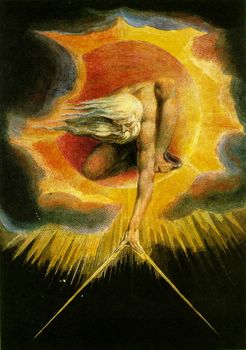 And I went to the crossroad mama, I looked east and west
And I went to the crossroad mama, I looked east and west
I went to the crossroad yeah, I looked east and west
Lord, I didn't have no sweet woman - oh yes, in my distress
Who Killed Cock Robin?
Who Killed Cock Robin?
I, said the Sparrow,
With my bow and arrow,
I killed Cock Robin.
Who Saw him Die?
I, said the Fly,
With my little eye,
I saw him die.
Who Caught his Blood?
I, said the Fish,
With my little dish,
I caught his blood.
Who'll Make his Shroud?
I, said the Beetle,
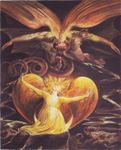 With my thread and needle,
With my thread and needle,
I'll make his shroud.
Who'll Dig his Grave?
I, said the Owl,
With my spade and trowel,
I'll dig his grave.
Who'll Bear the Torch?
I, said the Linnet,
Will come in a minute,
 I'll bear the torch.
I'll bear the torch.
Who'll be the Parson?
I, said the Rook,
With my little book,
I'll be the Parson.
Who'll be the Clerk?
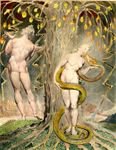 I, said the Lark,
I, said the Lark,
I'll say amen in the dark,
I'll be the Clerk.
Who'll be Chief Mourner?
I, said the Dove,
I mourn for my love,
I'll be Chief Mourner.
Who'll Sing the Dirge?
I, said the Thrush,
 As I sing in the bush,
As I sing in the bush,
I'll sing the dirge.
Who'll Lead the Way?
I, said the Martin,
When ready for starting
I'll lead the way.
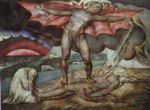 Who'll Carry his Coffin?
Who'll Carry his Coffin?
I, said the Kite,
If it be in the night,
I'll carry his coffin.
Who'll Bear the Pall?
We, said the Wren,
Both the cock and the hen,
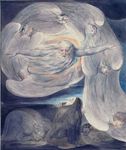 We'll bear his pall.
We'll bear his pall.
Who'll Toll the Bell?
I, said the Bull,
Because I can pull,
I'll toll the bell.
All the birds of the air
Fell sighing and sobbing,
When they heard the bell toll
For Poor Cock Robin.
I came across an antecedent for this intriguing verse - that it was the Norse god Baldur, who had been made invincible except for mistletoe, so eventually someone with a grudge shot him down using mistletoe. The grudge was strange - not unlike the 13th fairy in Sleeping Beauty, a social misunderstanding, envy, whatever, interesting ... the 13th fairy has always caught my attention, one of these days I will put my ideas on the subject together.
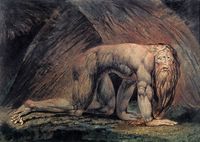 Daniel 4-33: The same hour was the thing fulfilled upon Nebuchadnezzar: and he was driven from men, and did eat grass as oxen, and his body was wet with the dew of heaven, till his hairs were grown like eagles' feathers, and his nails like birds' claws.
Daniel 4-33: The same hour was the thing fulfilled upon Nebuchadnezzar: and he was driven from men, and did eat grass as oxen, and his body was wet with the dew of heaven, till his hairs were grown like eagles' feathers, and his nails like birds' claws.
Naquele mesmo instante, cumpriu-se a sentença contra Nabucodonosor. Ele foi expulso do meio dos seres humanos e começou a comer capim como os bois. Dormia ao ar livre e ficava molhado pelo sereno. O seu cabelo ficou comprido, parecido com penas de águia, e as suas unhas cresceram tanto, que pareciam garras de um gavião.

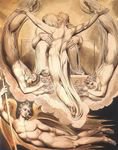
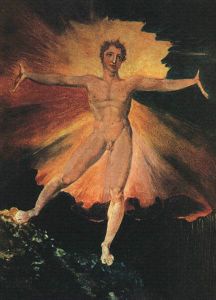
How did Blake name this last "Glad Day" I wonder? It had to be the Bible, I hazard a guess that it was Psalm 118:
Psalm 118:
The stone which the builders refused is become the head stone of the corner.
This is the Lord's doing; it is marvellous in our eyes.
This is the day which the Lord hath made; we will rejoice and be glad in it.
Salmos 118:
A pedra que os edificadores rejeitaram tornou-se a cabeça da esquina.
Da parte do Senhor se fez isto; maravilhoso é aos nossos olhos.
Este é o dia que fez o Senhor; regozijemo-nos, e alegremo-nos nele.
 I have discerned (stumbled upon, tripped over ...) another curve today, another few plotted points that run: Compassion, Ideology, Mediocrity - a shell game if you will. If the first quality of the World Wide Web is that of a plenum void, the second is surely mediocrity. These derive in part from the impossibly vague and imprecise capabilities of the primary language spoken there, HTML - so open to every casual distortion. And in part from anonymity - legions of Ginsberg hipsters "yacketayakking screaming vomiting whispering" unhooked from any notion of balance beyond the immediate self-gratifying moment. Centrifugal Yang forces out-of-control, snagging and whirling back upon themselves only by accident on the rough edges of the technology itself. Unrestrained solipsism where there are neither odours nor responsibility. 'Widening gyre' indeed.
I have discerned (stumbled upon, tripped over ...) another curve today, another few plotted points that run: Compassion, Ideology, Mediocrity - a shell game if you will. If the first quality of the World Wide Web is that of a plenum void, the second is surely mediocrity. These derive in part from the impossibly vague and imprecise capabilities of the primary language spoken there, HTML - so open to every casual distortion. And in part from anonymity - legions of Ginsberg hipsters "yacketayakking screaming vomiting whispering" unhooked from any notion of balance beyond the immediate self-gratifying moment. Centrifugal Yang forces out-of-control, snagging and whirling back upon themselves only by accident on the rough edges of the technology itself. Unrestrained solipsism where there are neither odours nor responsibility. 'Widening gyre' indeed.
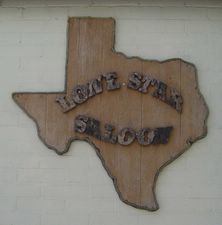 Things are gonna slide
Things are gonna slide
Slide in all directions
Won't be nothing,
Nothing you can measure anymore.
The blizzard,
The blizzard of the world
Has crossed the threshold
And it has overturned
The order of the soul.
When they said, they said
Repent! Repent! Repent!
I wonder what they meant.
When they said, they said
Repent! Repent! Repent!
I wonder what they meant. (Leonard Cohen, The Future)
Thomas Pynchon, 1963, V - Chapter One
In which Benny Profane, a schlemihl and human yo-yo, gets to an apocheir.
Since his discharge from the Navy Profane had been road-laboring and when there wasn't work just traveling, up and down the east coast like a yo-yo; and this had been going on for maybe a year and a half. After that long of more named pavements than he'd care to count, Profane had grown a little leery of streets, especially streets like this. They had in fact all fused into a single abstracted Street, which come the full moon he would have nightmares about: East Main, a ghetto for Drunken Sailors nobody knew what to Do With, sprang on your nerves with all the abruptness of a normal night's dream turning to nightmare. Dog into wolf, light into twilight, emptiness into waiting presence, here were your underage Marine barfing in the street, barmaid with a ship's propeller tattooed on each buttock, one potential berserk studying the best technique for jumping through a plate glass window (when to scream Geronimo? before or after the glass breaks?), a drunken deck ape crying back in the alley because last time the SP's caught him like this they put him in a strait jacket. Underfoot, now and again, came vibration in the sidewalk from an SP streetlights away, beating out a Hey Rube with his night stick; overhead, turning everybody's face green and ugly, shone mercury-vapor lamps, receding in an asymmetric V to the east where it's dark and there are no more bars.




___ 1966 ___ / ___ 1969 ___ / ___ 1971 ___ / __ 2002 ___ / ___ ??? ...
Apocheir is not in the OED; Pynchon describes it thus in V: "The point furthest from the sun is called aphelion. The point furthest from the yo-yo hand is called, by analogy, apocheir." Apo being Greek for away-off-apart-from; and cheir being Greek for hand.
Cobol-E, Laing, Tau, stuff
See just this Post & Comments
/ 0 Comments so far / Post a Comment /
Home 
Next, Back.
The musical background here is the Hollies singing Long Cool Woman in a Black Dress:
Saturday night I was downtown
Working for the FBI
Sitting in a nest of bad men
Whiskey bottles piling high
Bootlegging boozer on the west side
Full of people who are doing wrong
Just about to call up the DA man
When I heard this woman singing a song
A pair of 45's made me open my eyes
My temperature started to rise
She was a long cool woman in a black dress
Just a 5-9 beautiful tall
With just one look I was a bad mess
'Cause that long cool woman had it all
I saw her heading to the table
Well a tall walking big black cat
When Charlie said I hope that you're able, boy
Well I'm telling you she knows where it's at
Well then suddenly we heard the sirens
And everybody started to run
Jumping under doors and tables
Well I heard somebody shooting a gun
Well the DA was pumping my left hand
And she was holding my right
Well I told her, "Don't get scared
'Cause you're gonna be spared"
Well I'm gonna be forgiven
If I wanna spend my living
With a long cool woman in a black dress
Just a 5-9 beautiful tall
With just one look I was a bad mess
'Cause that long cool woman had it all
Had it all,
Had it all,
Had it all...
When I was just beginning in the systems business we used a language called COBOL - Common Business Oriented Language I think it meant, but even in those days there were flavours. Our particular flavour was Cobol-F, which was of course very much advanced over Cobol-E. This was in 1970 but even then there were some old timers who could not make the switch. My first big project was the development of year-end accounting for Sun Life of Canada. I was given two programmers one of whom was a woman who had been coding Cobol-E, apparently for too long. This strikes me as odd now that I think of it because really, in 1970, even Cobol-E had not been around for long - there must have been other factors involved. In any case, I was told that she was a no-hoper but that I should see if I could get anything useful out of her. She was not that old as I remember, a bit overweight and frumpy. There was a time before computers when clerks were clerks - she must have been one of them. Everyone else had given up on her. She sat on the next floor down, comfortably out of sight. She sat all day, mostly by herself, writing words on small pieces of paper and slipping them under her desk-mat when anyone came along. I was told this too but didn't believe it until I saw for myself. I came to her cubicle one day when she was not there and had a look - just words, five or six to a scrap, little rectangular scraps they were maybe two or three inches to a side, torn from a notepad. I wish I had taken the time to see what the words were, but I didn't. Anyway, I described the programs I wanted and she coded them up - in Cobol-E of course, there was nothing I could say that would change her habits. It was a joke really because the differences were negligible - saying Comp-3 instead of the full Computational-3 and so on. In the end I wrote a little translator to bring her code up to spec.
And that was it. I was not at Sun Life for long, maybe a year. She may have still been there when I left. I can't remember her name. I never got to know her. But lately I have found her coming into my mind again and again.
 I had read R.D. Laing's The Politics of Experience years before - in the 60s. It begins:
I had read R.D. Laing's The Politics of Experience years before - in the 60s. It begins:
"Even facts become fictions without adequate ways of seeing 'the facts'. We do not need theories so much as the experience that is the source of the theory. We are not satisfied with faith, in the sense of an implausible hypothesis irrationally held: we demand to experience the 'evidence'. We can see other people's behaviour, but not their experience. This has led some people to insist that psychology has nothing to do with the other person's experience, but only with his behaviour.
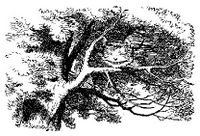 The other person's behaviour is an experience of mine. My behaviour is an experience of the other. The task of social phenomenology is to relate my experience of the other's behaviour to the other's experience of my behaviour. Its study is the relation between experience and experience: its true field is inter-experience. I see you, and you see me. I experience you, and you experience me. I see your behaviour. You see my behaviour. But I do not and never have and never will see your experience of me. Just as you cannot 'see' my experience of you. My experience of you is not 'inside' me. It is simply you, as I experience you. And I do not experience you as inside me. Similarly, I take it that you do not experience me as inside you.
The other person's behaviour is an experience of mine. My behaviour is an experience of the other. The task of social phenomenology is to relate my experience of the other's behaviour to the other's experience of my behaviour. Its study is the relation between experience and experience: its true field is inter-experience. I see you, and you see me. I experience you, and you experience me. I see your behaviour. You see my behaviour. But I do not and never have and never will see your experience of me. Just as you cannot 'see' my experience of you. My experience of you is not 'inside' me. It is simply you, as I experience you. And I do not experience you as inside me. Similarly, I take it that you do not experience me as inside you.
'My experience of you' is just another form of words for 'you-as-l-experience-you', and 'your experience of me' equals 'me-as-you-experience-me'. Your experience of me is not inside you and my experience of you is not inside me, but your experience of me is invisible to me and my experience of you is invisible to you. I cannot experience your experience. You cannot experience my experience. We are both invisible men. All men are invisible to one another. Experience used to be called The Soul. Experience as invisibility of man to man is at the same time more evident than anything. Only experience is evident. Experience is the only evidence. Psychology is the logos of experience. Psychology is the structure of the evidence, and hence psychology is the science of sciences."
"I cannot experience your experience.", he says. True. And he links this with 'faith' and 'the facts'.
Also in the 60s I had been given the idea of the 'objective correlative' as a means of understanding poetry. I trust the connection with the bit I quoted from Laing is obvious. One thinker goes along and proves categorically that faith is a fiction, and another comes along and turns fiction into faith. Like trying to nail a blob of mercury. It has gone on this way, swinging back and forth throughout my life in a subjective sense, and through all the ages of history too if I guess right.
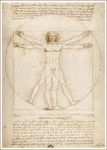 This morning I came across a scientific article telling me of a connection between MS, Multiple Sclerosis, and verbal skills ... just a sec ... yes: Verbal fluency deficits in multiple sclerosis., you can see an abstract at Galenicom.com. This made me laugh, because one of the very best programmers I know, the one who, on his first time out after a few weeks in some quick-and-dirty store-front programming school, coded a hidden-line removal program - this was in the late 70s and such things were notable. Anyway, this guy had MS. Whatever else programmers may be they are skilled linguists. QED.
This morning I came across a scientific article telling me of a connection between MS, Multiple Sclerosis, and verbal skills ... just a sec ... yes: Verbal fluency deficits in multiple sclerosis., you can see an abstract at Galenicom.com. This made me laugh, because one of the very best programmers I know, the one who, on his first time out after a few weeks in some quick-and-dirty store-front programming school, coded a hidden-line removal program - this was in the late 70s and such things were notable. Anyway, this guy had MS. Whatever else programmers may be they are skilled linguists. QED.
And bumblebees can't fly.
 I have been thinking a lot about mortality lately too - you can see where this is going eh? The notion that our job as cultural citizens is to somehow make sense of it all, or, failing that, of any tiniest fragment of it - came to me I think from Northrop Frye, but who cares. The game theorists tell me it is a zero sum game - no one gets out of here alive. Said another way - there is no sense to be made. Another blob of mercury. Laing incidentally, at the end of the book says something about "If I could drive you out of your mind ... etc.". That was the Bird of Paradise part I think. Well, I did all that and here I am haunted by a woman I never knew.
I have been thinking a lot about mortality lately too - you can see where this is going eh? The notion that our job as cultural citizens is to somehow make sense of it all, or, failing that, of any tiniest fragment of it - came to me I think from Northrop Frye, but who cares. The game theorists tell me it is a zero sum game - no one gets out of here alive. Said another way - there is no sense to be made. Another blob of mercury. Laing incidentally, at the end of the book says something about "If I could drive you out of your mind ... etc.". That was the Bird of Paradise part I think. Well, I did all that and here I am haunted by a woman I never knew.
When the tax man on the tax form asks for my occupation - I put 'clerk'. And, oh yeah, I do so now find myself just about where she was sitting, where I imagine she was sitting that is - not quite with the new dot-net paradigm, avoided by some of my colleagues who are, wondering where to go now, what to do.
 There is an almost-archetype here, an almost-voice, call it the Ancient Mariner figure. I could put Matthew Arnold's Dover Beach in there; Coetzee's Life and Times of Michael K; another one that I can't remember - about an artist searching for truth who winds up freezing to death in a shack high up on a mountain staring at a few brush strokes (Irving Stone was it?); David Malouf's An Imaginary Life; indeed wazizname, the canadian, Michael Ondaatje's The English Patient; Evelyn Waugh's A Handful of Dust; a-and Pynchon's Hugh Godolphin finding that he has been tricked by the iridescent monkeys. Can we maybe even draw a line from here to Humbert Humbert and his Lolita?
There is an almost-archetype here, an almost-voice, call it the Ancient Mariner figure. I could put Matthew Arnold's Dover Beach in there; Coetzee's Life and Times of Michael K; another one that I can't remember - about an artist searching for truth who winds up freezing to death in a shack high up on a mountain staring at a few brush strokes (Irving Stone was it?); David Malouf's An Imaginary Life; indeed wazizname, the canadian, Michael Ondaatje's The English Patient; Evelyn Waugh's A Handful of Dust; a-and Pynchon's Hugh Godolphin finding that he has been tricked by the iridescent monkeys. Can we maybe even draw a line from here to Humbert Humbert and his Lolita?

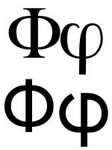 Drawing lines brings on another tangent, to Coxeter's` so excellent Introduction to Geometry, in which he examines Tau, some call it Phi - the Golden Mean or the Divine Proportion, expressed in the Fibonacci series and almost anything pentagonal, somehow also connected with the egyptian pyramids which are not particularly pentagonal, good old 1.61803... another darling of the 60s (although it could easily have been a simple confusion with Tao) and concludes that, "it is not a rule but a fascinating tendency." Coming from such a mind as this even the word 'tendency' has some weight. What about the slowly vanishing smile of the Cheshire Cat? Lewis Caroll? A mathematician; and another Humbert too, some people say. And, well, just to turn it on its head one more time, in that brief moment of acceleration after roller-coaster apogee, plunging headlong towards oblivion ... - Debra Lafave is in the news these days ...
Drawing lines brings on another tangent, to Coxeter's` so excellent Introduction to Geometry, in which he examines Tau, some call it Phi - the Golden Mean or the Divine Proportion, expressed in the Fibonacci series and almost anything pentagonal, somehow also connected with the egyptian pyramids which are not particularly pentagonal, good old 1.61803... another darling of the 60s (although it could easily have been a simple confusion with Tao) and concludes that, "it is not a rule but a fascinating tendency." Coming from such a mind as this even the word 'tendency' has some weight. What about the slowly vanishing smile of the Cheshire Cat? Lewis Caroll? A mathematician; and another Humbert too, some people say. And, well, just to turn it on its head one more time, in that brief moment of acceleration after roller-coaster apogee, plunging headlong towards oblivion ... - Debra Lafave is in the news these days ...
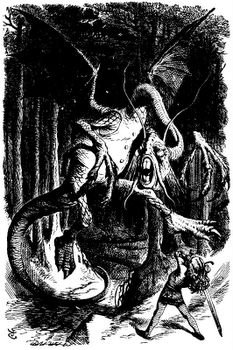 'Twas bryllig, and the slithy toves
'Twas bryllig, and the slithy toves
Did gyre and gimble in the wabe;
All mimsy were the borogoves,
And the mome raths outgrabe.
'Beware the Jabberwock, my son!
The jaws that bite, the claws that catch!
Beware the Jubjub bird, and shun
The frumious Bandersnatch!'
He took his vorpal sword in hand:
Long time the manxome foe he sought--
So rested he by the Tumtum tree,
And stood awhile in thought.
And as in uffish thought he stood,
The Jabberwock, with eyes of flame,
Came whiffling through the tulgey wood,
And burbled as it came!
 One, two! One, two! And through and through
One, two! One, two! And through and through
The vorpal blade went snicker-snack!
He left it dead, and with its head
He went galumphing back.
 'And hast thou slain the Jabberwock?
'And hast thou slain the Jabberwock?
Come to my arms, my beamish boy!
O frabjous day! Callooh! Callay!'
He chortled in his joy.
 'Twas brillig, and the slithy toves
'Twas brillig, and the slithy toves
Did gyre and gimble in the wabe;
All mimsy were the borogoves,
And the mome raths outgrabe.
For an interesting take on Jabberwocky see: THE ROBBER BRIDEGROOM
Tags: RD Laing, Golden Mean, Debra Lafave, Boobage.
 from Through the Looking-Glass, Chapter IV
from Through the Looking-Glass, Chapter IV Then they let go of Alice's hands, and stood looking at her for a minute: there was a rather awkward pause, as Alice didn't know how to begin a conversation with people she had just been dancing with. 'It would never do to say "How d'ye do?" NOW,' she said to herself: 'we seem to have got beyond that, somehow!'
Then they let go of Alice's hands, and stood looking at her for a minute: there was a rather awkward pause, as Alice didn't know how to begin a conversation with people she had just been dancing with. 'It would never do to say "How d'ye do?" NOW,' she said to herself: 'we seem to have got beyond that, somehow!' 'Ye-es, pretty well--SOME poetry,' Alice said doubtfully. 'Would you tell me which road leads out of the wood?'
'Ye-es, pretty well--SOME poetry,' Alice said doubtfully. 'Would you tell me which road leads out of the wood?' The sun was shining on the sea,
The sun was shining on the sea, “To come and spoil the fun!”
“To come and spoil the fun!”
 The eldest Oyster looked at him,
The eldest Oyster looked at him, The Walrus and the Carpenter
The Walrus and the Carpenter “It was so kind of you to come!
“It was so kind of you to come! “I weep for you,” the Walrus said:
“I weep for you,” the Walrus said:
 Tweedle-dee Dum and Tweedle-dee Dee
Tweedle-dee Dum and Tweedle-dee Dee Tweedle-dee Dee and Tweedle-dee Dum
Tweedle-dee Dee and Tweedle-dee Dum




 I went over to Lakewood Church this morning, to listen to Joel Osteen, the Houston evangelist. My friend Big Mike the taxi driver, says he should be President.
I went over to Lakewood Church this morning, to listen to Joel Osteen, the Houston evangelist. My friend Big Mike the taxi driver, says he should be President. Joel himself was not there this morning - his brother Paul, a woman - I didn't get her name, and the spanish language pastor Marcos Witt filled in for him.
Joel himself was not there this morning - his brother Paul, a woman - I didn't get her name, and the spanish language pastor Marcos Witt filled in for him. Marcos Witt preached on hurt and anger and bitterness. He said put them away. He said put it all in the garbage, because it is garbage and it makes you stink. He gave a few practical tips to help you do that - love your enemy and forgive those who hate you. He called the congregation 'champions'. He said you can't be champions if you are dragging around all of the rebukes you have ever received so put them down and leave them down.
Marcos Witt preached on hurt and anger and bitterness. He said put them away. He said put it all in the garbage, because it is garbage and it makes you stink. He gave a few practical tips to help you do that - love your enemy and forgive those who hate you. He called the congregation 'champions'. He said you can't be champions if you are dragging around all of the rebukes you have ever received so put them down and leave them down.

























 Drawing lines brings on another tangent, to Coxeter's` so excellent Introduction to Geometry, in which he examines Tau, some call it Phi - the Golden Mean or the Divine Proportion, expressed in the Fibonacci series and almost anything pentagonal, somehow also connected with the egyptian pyramids which are not particularly pentagonal, good old 1.61803... another darling of the 60s (although it could easily have been a simple confusion with Tao) and concludes that, "it is not a rule but a fascinating tendency." Coming from such a mind as this even the word 'tendency' has some weight. What about the slowly vanishing smile of the Cheshire Cat? Lewis Caroll? A mathematician; and another Humbert too, some people say. And, well, just to turn it on its head one more time, in that brief moment of acceleration after roller-coaster apogee, plunging headlong towards oblivion ... - Debra Lafave is in the news these days ...
Drawing lines brings on another tangent, to Coxeter's` so excellent Introduction to Geometry, in which he examines Tau, some call it Phi - the Golden Mean or the Divine Proportion, expressed in the Fibonacci series and almost anything pentagonal, somehow also connected with the egyptian pyramids which are not particularly pentagonal, good old 1.61803... another darling of the 60s (although it could easily have been a simple confusion with Tao) and concludes that, "it is not a rule but a fascinating tendency." Coming from such a mind as this even the word 'tendency' has some weight. What about the slowly vanishing smile of the Cheshire Cat? Lewis Caroll? A mathematician; and another Humbert too, some people say. And, well, just to turn it on its head one more time, in that brief moment of acceleration after roller-coaster apogee, plunging headlong towards oblivion ... - Debra Lafave is in the news these days ... 




